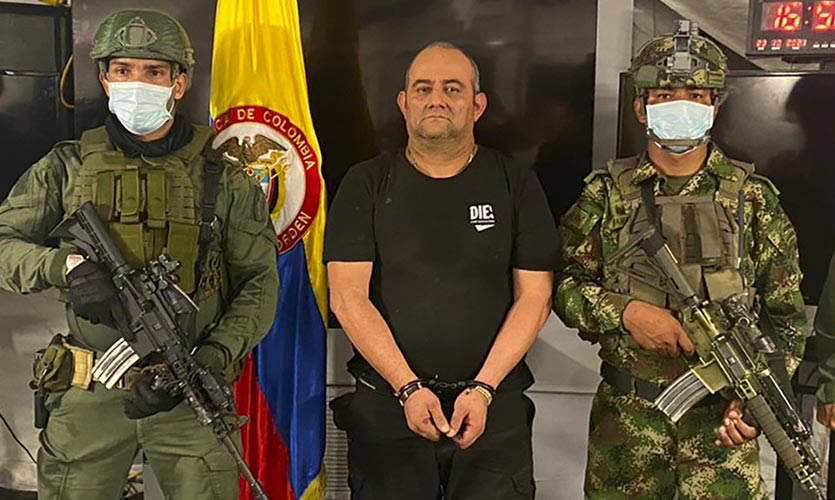Colombian President Iván Duque Márquez has said that Dairo Antonio Úsuga, also known as Otoniel, one of South America’s most wanted men, has been captured at his jungle hideout following a massive manhunt involving hundreds of troops and the US and British intelligence agencies. The 50-year-old head of the Clan del Golfo drug cartel was arrested on Saturday afternoon after heavily armed operatives surrounded his jungle hideout in northwest Colombia.
Otoniel was apprehended at his remote refuge in the Antioquia region in northwestern Colombia near the Panama border. The mission included 500 soldiers and 22 helicopters. One officer was killed in the line of duty. Otoniel reportedly utilised a network of remote safe homes to travel and avoid the police, and depended on couriers for contact instead of a phone.
A joint operation between the army, air force, and the police resulted in Otoniel’s capture and he was taken into custody on Saturday. Otoniel, who was born in Antioquia in the early 1970s, jumped between several guerrillas and paramilitary groups including the Farc (Revolutionary Armed Forces of Colombia) – a major Marxist-Leninist rebel group, and the United Self-Defense Forces of Colombia (AUC) – a far-right paramilitary and drug trafficking gang. When the AUC was disbanded in 2005, he went to work for drug lord Daniel Rendón Herrera, also known as Don Mario, who was the leader of Los Urabeños gang that eventually became Clan del Golfo. After the previous head of the organisation, his brother was slain by the police in a raid on a New Year’s Eve celebration over ten years ago, and Otoniel took over.
Authorities in Colombia describe Clan del Golfo as the country’s most powerful criminal organisation, while authorities in the US describe it as “extremely violent and heavily armed”. In addition to smuggling drugs and people, illegal gold mining, and extortion, the gang operates in many provinces and has extensive international connections. Furthermore, the government claims that the group threatens and kills community leaders across the country. Even though the Colombian president said that Otoniel’s capture marks the end of the Clan del Golfo, the Colombian Risk Analysis director, Sergio Guzman says that a new leader is surely waiting to take over the gang. “It’s a big deal because he’s the biggest drug kingpin in Colombia,” Guzman said, adding that the capture would not change the fundamentals of drug trafficking. “Otoniel is bound to be replaced.”
Approximately 1,800 armed members who are mostly recruited from far-right paramilitary groups are believed to be a part of the organisation. A number of members have been arrested in Argentina, Brazil, Honduras, Peru and Spain. Several routes used to smuggle drugs from Colombia to the US and Russia are controlled by the gang. Colombia’s government, however, believes that it has decimated its numbers in recent years, forcing many of its leaders to hide in remote parts of the jungle.
Otoniel has several charges against him such as sending shipments of cocaine to the US, killing police officers and recruiting children. Having been indicted in the US in 2009, he faces possible extradition proceedings, meaning that he may be brought to New York for trials in the future.
There was an $800,000 reward offered by the Colombian government for information about his whereabouts, while the US had placed a $5 million bounty on his head. President Iván Duque applauded the capture of Otoniel in a video message saying, “This is the biggest blow against drug trafficking in our country this century… only comparable to the fall of Pablo Escobar in the 1990s.”
Read more: Clashes Between The Taliban And IS-KP Deepen Afghanistan Crisis
The police have found orthopaedic mattresses in these sparse homes in the past as he suffered from back pain caused by a herniated disc. According to the commander of police Jorge Vargas, the drug lord never approached inhabited areas for the fear of being captured.
El Tiempo newspaper reported that authorities were able to pinpoint the location where he was finally captured, two weeks ago. More than 50 signal intelligence experts tracked the movements using satellite imagery. Both the US and the UK participated in the search. AFP quoted Duque as saying the operation was “the largest penetration of the jungle in our country’s history”.
Later, the Colombian military released a picture of its soldiers guarding Otoniel, who was handcuffed and wearing rubber boots. Several massive operations involving thousands of police officers have been conducted in recent years in an attempt to capture the 50-year-old, but none had been successful.










